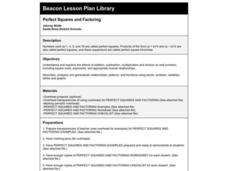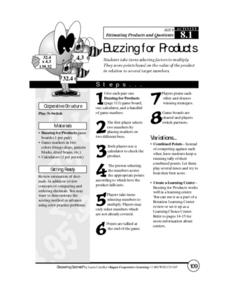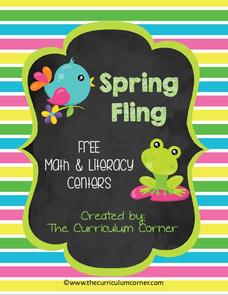Curated OER
Using a Multiplication Table to Divide
Learners solve division problems. In this multiplication and division lesson plan, pupils practice using a multiplication table to find a missing factor in a multiplication sentence. They use the same strategy to find a missing quotient...
Curated OER
Challenge: Prime Numbers
In this exploring prime numbers worksheets, learners use the definition of prime numbers to solve 4 problems, then list prime and composite numbers from 2-18.
Curated OER
Exercise Set 3.3: Dividing Polynomials
In this dividing polynomials worksheet, students divide 42 polynomials. Students factor polynomials using synthetic division and long division.
Curated OER
Factoring Perfect-Square Trinomials and Differences of Squares
In this algebra worksheet, students factor expressions into the product of two binomials. Four of the problems involve factoring perfect square trinomials. The remaining eight problems require students to factor problems that are the...
Curated OER
Perfect Squares and Factoring
A teacher guided lesson on perfect squares and factoring. They discuss perfect squares, observe the expansion steps for finding the product, and practice solving problems. They complete a worksheet on perfect squares and factoring.
Curated OER
Multiplying Exponents vs. Powers of Powers
Use the power of a power property to solve exponential functions. The lesson refers to differentiating between multiplying or adding exponents to find the value, and how to find the product of a power of a power.
Curated OER
Arrays
Learners solve six word problems where they use the array model of multiplication to find the product of multiplication problems with factors 0 to 12.
Curated OER
Simple Factoring of Polynomials
In this polynomial learning exercise, students use the factoring method to simplify polynomials. Examples and explanations are provided on this two-page learning exercise. Ten problems are included.
Curated OER
Mathematics: Prime and Composite Numbers
Sixth graders explore how to apply the commutative property and the rules of divisibility. They examine the difference between prime and composite numbers.
Curated OER
Writing Exponents
In this writing exponents worksheet, 9th graders solve 10 different problems that include writing various types of exponents. They write each set of numbers in exponential form. Then, students list the base and whole number to the...
Curated OER
Binomial and Polynomial Worksheet
For this problems solving worksheet, 6th graders write the degree of 4 polynomials, rewrite 4 polynomials in standard form and solve 4 polynomial equations. Students use the distributive property to find 6 products, solve 10 binomial...
Curated OER
Capital for Cookies
Fourth graders find the meaning for capital, land, labor and enterprise and relate them to economics of a place. In this economics lesson, 4th graders form a company to make an agricultural product and look for the resources they will...
Curated OER
Buzzing for Products
Students practice multiplication playing a game. In this multiplication lesson plan, students pick numbers and multiply them together. Students are awarded points based on which "hive" their answer falls in. The student with the...
Curated OER
Free Enterprise -- Product Cost
Students are introduced to the concept of free enterprise. In groups, they discuss the price of various food items and decide on which item to produce. They calculate the cost of producing the item and share their results with the class.
Curated OER
Environmental Conditions: Friend or Foe
Students research and answer questions on how organisms are classified and how their needs are met through their environment. They work in small groups and create a poster, chart, rap, PowerPoint, or brochure demonstrating how organisms...
Houghton Mifflin Harcourt
Unit 2 Math Vocabulary Cards (Grade 6)
Common denominator, invert, and terminating decimal are only a few terms found in a set of math vocabulary math cards. Made up of 40 cards, the set reinforces terms with boldly printed word cards, and definition cards offering an example...
West Contra Costa Unified School District
Simplifying Fractions
Encourage family participation at home with a reference tool designed to support learners' practice of simplifying fractions. Two pages offer detailed descriptions and labeled examples.
101 Questions
Dandy Candies
Package design is an economic necessity. Young scholars assume the role in an interesting inquiry-based lesson. Given 24 cubic shaped candies to package, they must determine the arrangement that uses the least amount of cardboard to...
Curriculum Corner
Spring Fling Math and Literacy Centers
Fling your class into spring with a set of math and literacy center worksheets. Learners will enjoy the variety with sheets that practice multiplication, missing addends, before/after and more/less than number comparisons, as well as...
Practical Money Skills
Making Decisions
Money represents decisions: spending decisions, saving decisions, and investing decisions. Encourage young adults to think about the decisions they make with their money in a three-day unit about personal finance, consumer spending, and...
Curated OER
Zero Product Property and Quadratics
In this quadratic worksheet, algebra learners use the zero product property to solve basic quadratic equations. They identify where the parabola crosses the x-axis. Explanations and examples are provided. Answers are located on page two....
Curated OER
Factoring and Solving Quadratics Self-Test
This worksheet provides good practice of factoring expressions and solving quadratic equations by factoring. It also includes a word problem and graphing an equation using a calculator. This one-page worksheet contains 17 polynomial...
Curated OER
How Does News Influence Stock Prices?
Students examine how economic news and business events can change the price of a stock. They see that the unexpected events that benefit or harm the company in turn move the company's stock price up or down.
Curated OER
Personalities of the Renaissance
Have the class interpret historical evidence presented in primary and secondary resources. They examine sources regarding architecture, art, exploration, government, literature, religion, and technology of the era. Then they use their...

























